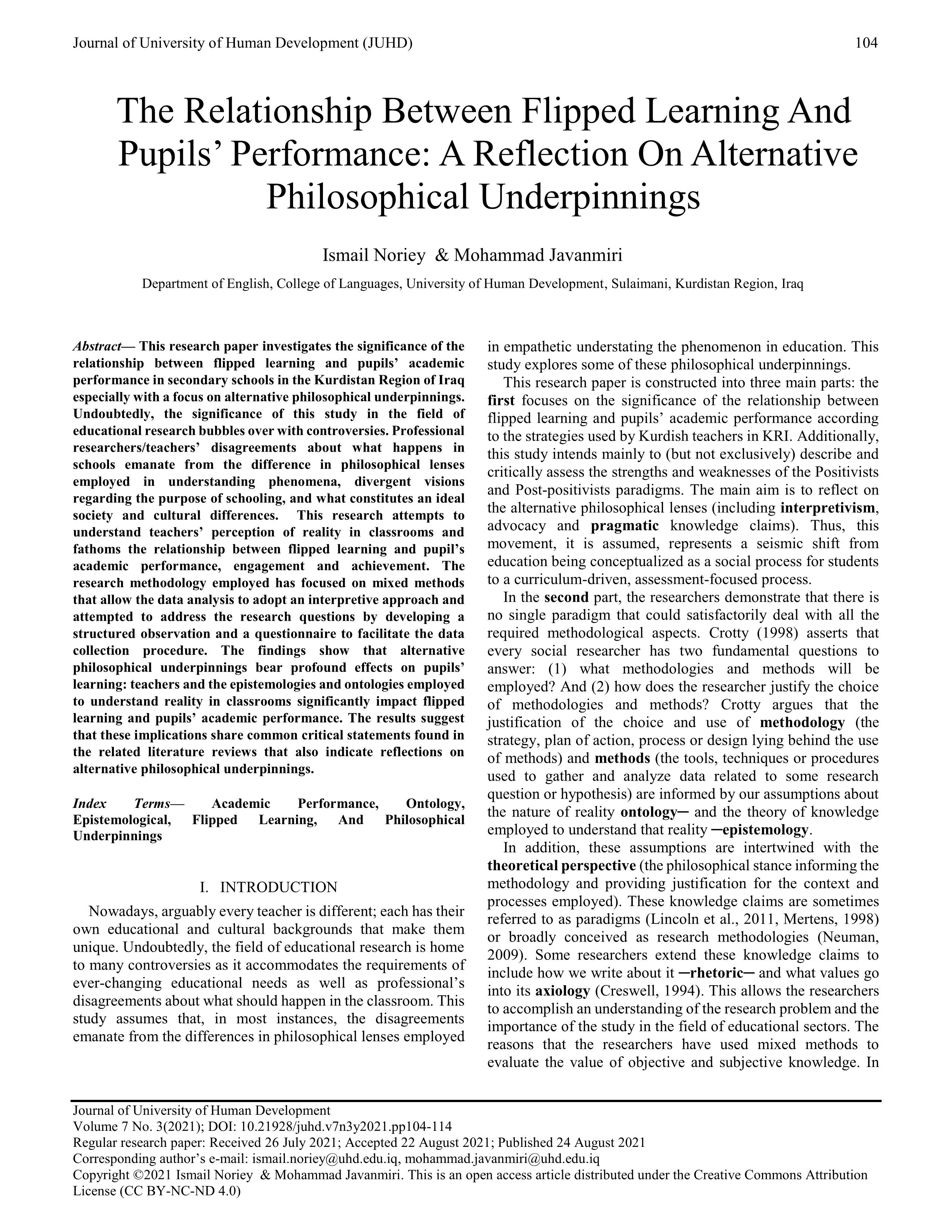The Relationship Between Flipped Learning And Pupils’ Performance: A Reflection On Alternative Philosophical Underpinnings
DOI:
https://doi.org/10.21928/juhd.v7n3y2021.pp104-114Keywords:
Academic Performance, Ontology, Epistemological, Flipped Learning, Philosophical UnderpinningsAbstract
This research paper investigates the significance of the relationship between flipped learning and pupils’ academic performance in secondary schools in the Kurdistan Region of Iraq especially with a focus on alternative philosophical underpinnings. Undoubtedly, the significance of this study in the field of educational research bubbles over with controversies. Professional researchers/teachers’ disagreements about what happens in schools emanate from the difference in philosophical lenses employed in understanding phenomena, divergent visions regarding the purpose of schooling, and what constitutes an ideal society and cultural differences. This research attempts to understand teachers’ perception of reality in classrooms and fathoms the relationship between flipped learning and pupil’s academic performance, engagement and achievement. The research methodology employed has focused on mixed methods that allow the data analysis to adopt an interpretive approach and attempted to address the research questions by developing a structured observation and a questionnaire to facilitate the data collection procedure. The findings show that alternative philosophical underpinnings bear profound effects on pupils’ learning: teachers and the epistemologies and ontologies employed to understand reality in classrooms significantly impact flipped learning and pupils’ academic performance. The results suggest that these implications share common critical statements found in the related literature reviews that also indicate reflections on alternative philosophical underpinnings.
References
Bergmann, J. & Sams, A. (2012). Flip your classroom: Reach every student in every class every day, International Society for Technology in Education.
Bergmann, J. & Sams, A. (2014). Flipped learning: Gateway to student engagement, International Society for Technology in Education.
Bransford, J. D., Brown, A. L. & Cocking, R. (2000). How people learn: Brain. Mind, Experience, and School, 2.
Brunsell, E. & Horejsi, M. (2013). Flipping Your Classroom in One” Take”. The Science Teacher, 80, 8.
Cherry Holmes, C. H. (1988). Power and criticism poststructural investigations in education.
Cherry Holmes, C. H. (1994). More notes on pragmatism. Educational researcher, 16-18.
Creswell, J. W. (1994). Qualitative and quantitative approaches. Qualitative and quantitative approaches.
Crotty M. (1998). The foundations of social research: Meaning and perspective in the research process, Sage.
DE vaus, D. A, vaus, D (2001). Research design in social research, Sage.
Halfpenny, P. (2014). Positivism and Sociology (RLE Social Theory): Explaining Social Life, Routledge.
Herreid, C. F. & Schiller, N. A. (2013). Case studies and the flipped classroom. Journal of College Science Teaching, 42, 62-66.
Hua, L. V., Goodwin, D. & Weiss, A. (2013). Traditional vs. Blended Learning of Pharmacology. Optometric Education, 39, 28-34.
Hume, D. (1962). A treatise of human nature. Book 1: Of the understanding, Meridian.
Kandel, E. R. (2008). Psychiatry, psychoanalysis, and the new biology of the mind, American Psychiatric Pub.
Kohn, A. (1999). The schools our children deserve, Boston: Houghton Mifflin.
Kohn, A. (2007). The homework myth: Why our kids get too much of a bad thing, Da capo press.
Levacic, R. (2005). Educational Leadership as a Causal Factor: Methodological Issues in Research on Leadership” Effects”. Educational Management Administration & Leadership, 33, 197-210.
Lincoln, Y. S. & Guba, E. G. (1985). Naturalistic inquiry, Sage.
Lincoln, Y. S. Lynham, S. A. & Guba, E. G. (2011). Paradigmatic controversies, contradictions, and emerging confluences revisited. The Sage handbook of qualitative research, 4, 97-128.
Little, D. (1991). Varieties of social explanation: An introduction to the philosophy of social science.
Luckmann, T. (1966). The social construction of reality: A treatise in the sociology of knowledge, Anchor Books.
Martin, H. (1994). The philosophy of social science–an introduction. Cambridge University Press.
Mertens, D. M. (1998). Research methods in education and psychology: Integrating diversity with quantitative & qualitative approaches.
Murrhy, J. P. (1990). Pragmatism: From Peirce to Davidson, Westview Pr.
Neuman, W. L. (2009). Social research methods: Quantitative and qualitative methods. Allyn & Bacon.
Patton, M. Q. (1990). Qualitative evaluation and research methods, SAGE Publications, inc.
Pirie, S. E. (1996). Classroom Video-Recording: When, Why and How Does It Offer a Valuable Data Source for Qualitative Research?
POLKINGHORNE, D. 1983. Methodology for the human sciences: Systems of inquiry, Suny Press.
Popper, K. (1993). Unended Quest: An Intellectual Autobiography, Karl Popper, London: Routledge.
Pring, R. (2004). The Philosophy of Education, Bloomsbury Publishing.
Proudfoot, M. & LACEY, A. R. (2009). The Routledge dictionary of philosophy, Routledge.
Rabinow, P. (1987). Interpretive social science: A second look, Univ of California Press.
Reichardt, C. S. & RALLIS, S. F. (1994). The Qualitative- Quantitative Debate: New Perspectives. New directions for program evaluation, 61, 1-98.
Robinson, K. & Aronica, L. (2015). Creative Schools: Revolutionizing Education from the Ground Up, Penguin UK.
Rorty, R. (1993). Feminism, ideology, and deconstruction: A pragmatist view. Hypatia, 8, 96-103.
Rossman, G, B. & Wislon, B. L. (1985). Numbers and words combining quantitative and qualitative methods in a single large-scale evaluation study. Evaluation Review, 9, 627-643.
Schwandt, T. A. (2000). Three epistemological stances for qualitative inquiry. Handbook of qualitative research, 2, 189-213.
Watson, J. B. (1919). Psychology: From the standpoint of a behaviourist, Lippincott.

Downloads
Published
How to Cite
Issue
Section
License
Copyright (c) 2021 Ismail Mohammed Noriey, Mohammad Sedigh Javanmiri

This work is licensed under a Creative Commons Attribution-NonCommercial-NoDerivatives 4.0 International License.


